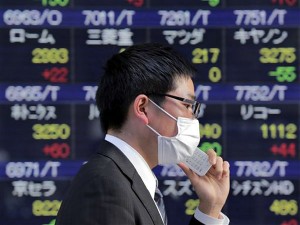Asian markets mixed, BoJ move disappoints

A man walks by the electronic stock board of a securities firm in Tokyo on Tuesday, Jan. 22, 2013. Asian stock markets wavered between gains and losses Tuesday after Japan’s central bank ceded to political pressure and announced stimulus measures aimed at extricating the country from years of economic malaise. AP PHOTO/ITSUO INOUYE
HONG KONG—Asian markets were mixed on Tuesday, with Tokyo’s Nikkei falling and the yen strengthening as the Bank of Japan’s plan to boost the economy disappointed dealers.
After a two-day meeting the central bank said it would adopt a 2-percent inflation target demanded by the country’s new government while also launching an open-ended asset-purchase scheme.
Tokyo enjoyed an initial and brief surge after the announcement, jumping into positive territory, but soon fell back as investors read the details.
The Nikkei index ended 0.35 percent, or 37.81 points, lower at 10,709.93.
Seoul gained 0.49 percent, or 9.66 points, to 1,996.52, while Sydney was flat, nudging up 1.6 points to 4,779.1.
Hong Kong was 0.29 percent higher, adding 68.08 points, to 23,658.99 but Shanghai fell 0.56 percent, or 13.08 points, to 2,315.14.
The Japanese central bank also lifted its growth forecast, predicting gross domestic product would expand 2.3 percent in the year ended March 2014, up from an earlier 1.6 percent estimate.
The dollar and euro quickly rose against the yen but the advances were soon reversed.
In afternoon trade the dollar, which on Friday in New York hit 90.24 yen—its highest since June 2010—bought 89.02 yen in Tokyo against 89.50 yen late Monday in Europe.
The euro bought 118.96 yen from 119.20 yen while the single currency bought $1.3358 against $1.3320.
US markets were closed on Monday for a public holiday, as President Barack Obama was sworn in for a second term.
Prime Minister Shinzo Abe, who swept to power last month, has moved to bring BoJ policies into line with his new government’s position. But the plan failed greatly to impress investors.
“Upon closer review, the BoJ’s plan had already been so well telegraphed into the market that ‘merely meeting expectations’ did not cut it for investors,” an equity trading director at a foreign brokerage told Dow Jones Newswires.
“In the end, while the yen weakening over the last two months has been nice to see—and especially welcome for exporters’ margins—key US and European growth needs to return to help corporate fundamentals to improve.”
Oil prices were mixed. New York’s main contract, light sweet crude for delivery in February, rose 53 cents to $96.09 a barrel in the afternoon while Brent North Sea crude for March gained 33 cents to $112.02.
Gold was at $1,692.41 at 1030 GMT compared with $1,688.89 late Monday.
In other markets:
— Taipei rose 0.44 percent, or 34.18 points, to 7,759.1.
Taiwan Semiconductor Manufacturing Co. was 0.50 percent higher at Tw$101.0 while leading integrated circuit design house MediaTek added 0.63 percent to Tw$318.5.
— Manila fell 1.08 percent, or 66.80 points, to 6,104.90.
— Wellington was flat, edging up 1.90 points to 4,187.08.
Telecom added 0.21 percent to NZ$2.365, Contact Energy was unchanged at NZ$5.17 and Fletcher Building was down 0.11 percent at NZ$9.29.
— Singapore closed down 0.05 percent, or 1.46 points, to 3,219.86.
United Overseas Bank gained 0.91 percent to Sg$18.80, while Fraser and Neave dropped 1.95 percent to Sg$9.55.
— Kuala Lumpur fell 6.97 points, or 0.43 percent, to 1,628.66.
Telekom Malaysia shed 0.5 percent to 5.55 ringgit and UEM Land Holdings dipped 1.4 percent to 2.15.
— Bangkok lost 0.44 percent, or 6.39 points, to 1,434.09.
Oil company PTT fell 0.30 percent to 335 baht, while coal producer Banpu dropped 0.75 percent to 396 baht.
— Jakarta ended down 23.43 points, or 0.53 percent, at 4,416,55.
Miner Aneka Tambang dropped 3.68 percent to 1,310 rupiah and cigarette maker Gudang Garam slid 1.86 percent to 52,700 rupiah.
— Mumbai fell 0.50 percent, or 120.25 points, to 19,981.57 points.